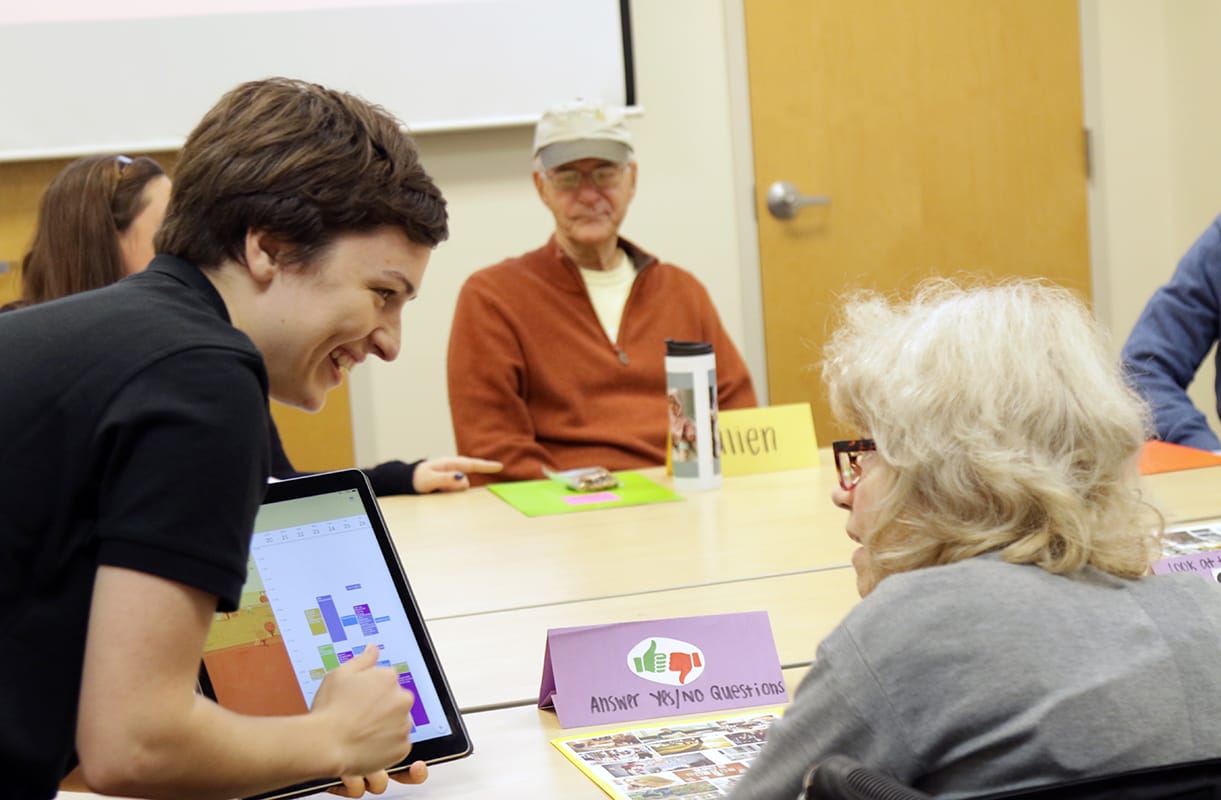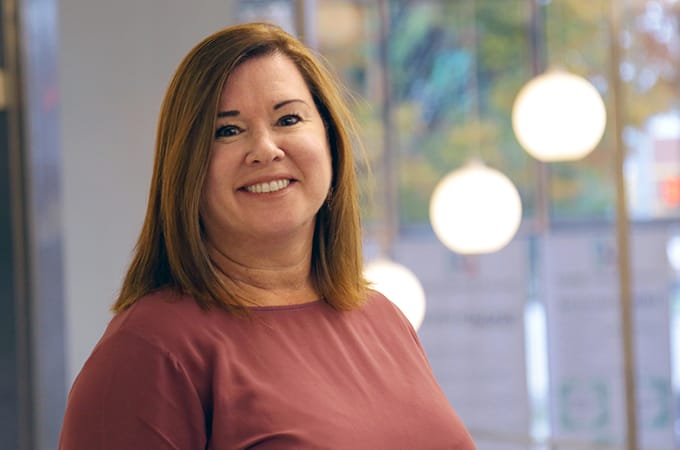
Mission in Action
Loyola Clinical Centers provides services and treatment to local community members and partner organizations

If you ask Kara Vincent, M.S., CCC-SLP, about the work of the Loyola Clinical Centers (LCC), she’ll be the first to say it depends whom you ask.
For more than 14 years, the LCC has been providing clinical education to Loyola University Maryland graduate students and services to clients in the areas of literacy, psychology, and speech-language pathology/audiology from its main location at Belvedere Square in Baltimore, the Graduate Center in Columbia, Md., and off-site locations at schools and partner organizations throughout the Greater Baltimore community.
Clients range in age from 18 months to 80 years, and they visit the LCC for a range of services and treatments—from hearing screenings to literacy and psychoeducational assessments to treatment for acquired brain injuries and speech-language developmental difficulties, as well as individual and group counseling. All services are provided by graduate student clinicians in their respective academic programs and supervised by licensed and certified clinical faculty.
I want to be able to stand on the rooftop and shout about what we’re doing here and who we are. We change people’s lives every day.
No matter the work or the week, Vincent’s response will be heartfelt.
She recently recalled a client who attended the Intensive Treatment for Aphasia Program (ITAP), a summer session for adults with speech-language disorders typically caused by stroke. Much of ITAP is client-directed; individuals set goals for what they hope to achieve with treatment. “One man, all he wanted to do was tell his partner he loved her,” Vincent said, her voice cracking with emotion. “It was a struggle for him, but he stood up in the room and told her.”
 Kara Vincent, M.S., CCC-SLP, executive director of the LCC
Kara Vincent, M.S., CCC-SLP, executive director of the LCC
Appointed to her role in June 2019, Vincent serves as executive director of the LCC, and her roots at Loyola run deep. She completed both her undergraduate and graduate degrees from the University (in 1991 and 1993, respectively). She taught undergraduate courses in the department of speech-language-hearing sciences for seven years prior to becoming the speech-language division director at the LCC, a position she held for the past seven years. She’s also a Loyola parent.
During her time at the LCC, Vincent has amassed a breadth of stories that illustrate the group’s multilayered work and diverse client base. Once she received a phone call from an expectant mother who, upon learning her unborn child had Down syndrome, called the LCC to proactively learn more about registering her baby for speech and language services because of the LCC’s impeccable reputation for working with children with the genetic disorder. Another woman can finally answer her phone because, thanks to an assessment and new hearing aids provided through the LCC and partnerships with Rebuilding Together Baltimore and Cigna, she can now hear it ring.
The LCC is unique in that it does not accept health insurance. Instead, it offers its services at a significantly decreased cost: as low as 70% less than market rate, based on their sliding scale fee schedule aligned with the federal poverty guidelines.
We say we are ‘mission in action,’ and one of our missions is to provide access to care for the underserved.
Part of that mission is service to the local community. The LCC collaborates with the University’s Center for Community, Service, and Justice’s York Road Initiative to identify partners who can expand the LCC’s work beyond its walls. For example, the LCC provides hearing assessments and other services at Govans Elementary School and has partnered with the educational nonprofit One Love Foundation on violence prevention programming.
This rich environment of mission-driven clinical care plays an important role in graduate education for Loyola students who receive a practitioner-based curriculum taught by highly-skilled clinical faculty. Rotations at the LCC are essential components of the graduate programs in psychology, education, and speech-language-hearing sciences at Loyola, combining scholarship and hands-on experience in interprofessional training clinics.
Maggie McGuire, now in her third year of Loyola’s Psy.D. program, spent two years at the LCC as part of her doctorate in clinical psychology. She continues to work there today as a graduate assistant.
“The LCC has a nice blend of support with Loyola faculty and supervisors and involvement with the community in which the University is located,” she said. “I was excited to come to Loyola because of the wide range of opportunities that I would gain experience from, including training in assessments and individual and group therapy. We were afforded a real breadth of experience early on that you don’t always get from other programs or training sites.”
Graduate students learn more than how to assess and treat, Vincent explained. They also learn the Jesuit ideal of cura personalis, care for the whole person.
We want our graduate students to learn to work interprofessionally and have the skills they need to thrive in their fields,” Vincent said. “It is my hope that they leave here better versions of themselves with more awareness not only of the textbook material but of the mission of giving back.
During the 2018-19 academic year, the LCC trained more than 90 graduate students, worked with close to 3,500 clients in more than 14,000 visits (both on- and off-site), and discounted more than $400,000 worth of services.
“The Loyola Clinical Centers’ commitment to social justice is evident through our concerted effort to increase access to services by maintaining low fees, offering sliding scale discounts to those who demonstrate financial need, and providing off-site services in the community,” said K. Hadley Cornell, M.S. ’06, Psy.D. ’09, division director of psychology. “We are attempting to reduce barriers so that services are more accessible for the underserved.”
Vincent wholeheartedly agrees.
“I want to be able to stand on the rooftop and shout about what we’re doing here and who we are,” she said. “We change people’s lives every day.”
That transformative work happens thanks to gifts from donors, who have given in more significant ways since the University made it a priority during the recently concluded Bright Minds, Bold Hearts comprehensive campaign.
“The services offered by the Loyola Clinical Centers are possible because of the generous support of alumni, grateful patients, and other donors—and continued philanthropic support will be critical going forward,” said Terrence Sawyer, senior vice president. “People choose to support the LCC not only because they recognize how members of our community benefit from the exceptional services, but because they also understand the value of the learning and research that happens there.”
Loyola Clinical Centers Services
- Audiology
- Literacy
- Psychology
- Speech-Language Pathology
Learn More About the Loyola Clinical Centers